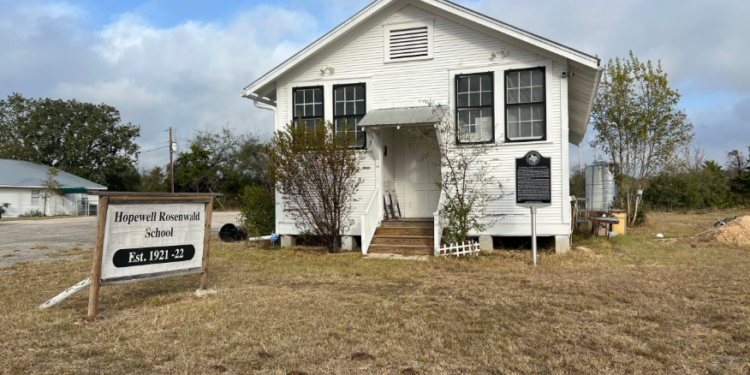Nov 18, 2024 Story by: Editor
Two weeks ago, the Bullock Texas State History Museum launched a temporary exhibition spotlighting Black education in the early 20th century.
“We’ve been planning this for months,” said curator James McReynolds. “It’s a culmination of a lot of hard work.”
Titled “A Better Life for Their Children: Julius Rosenwald, Booker T. Washington, and the 4,978 Schools that Changed America,” the exhibition showcases 23 black-and-white photographs capturing the rudimentary conditions of schools attended by Black students in the South post-slavery.
“They did not have running water or electricity,” McReynolds explained. “So these schools needed stoves to keep the buildings warm in the winter to cook food on.”
Before the Civil War, public education was non-existent in the South. Efforts to establish school systems during Reconstruction faced obstacles, including racist state policies, which created significant funding disparities between white and Black schools.
“The Freedmen’s Bureau, organized by the federal government, founded several schools in the state that offered classes to African Americans,” wrote the Texas Historical Commission. “But Texas’ segregated public education system continued to underfund African American scholastic activities.”
To combat these inequities, wealthy Northern philanthropists took action, with Julius Rosenwald leading the charge.
“Rosenwald was the president of Sears, Roebuck and Company, which was the largest company in the world at the time,” McReynolds noted. “He heavily believed in the importance of education.”
Rosenwald partnered with Booker T. Washington, a former slave and principal of the Tuskegee Normal and Industrial Institute, to address the racial education gap. From 1912 to 1932, their collaboration resulted in the construction of nearly 5,000 schools, primarily in rural Southern areas.
By 1920, Texas was a significant beneficiary of these efforts.
“The Rosenwald Fund supported the construction of nearly 500 schools in the state of Texas,” McReynolds highlighted. “It also supported the construction of teacher’s homes and industrial shops in 82 different counties.”
Many of these schools fell into disrepair after integration, but their historical significance endures. The exhibition includes artifacts from former Rosenwald schools, such as a student desk and potbelly stove from the Hopewell School in Bastrop County.
A map at the exhibition also details the locations of Rosenwald schools in Texas, most concentrated in East and Northeast Texas, areas with significant Black populations before Emancipation.
“In 1993, the Texas Historical Commission began a survey of all Rosenwald-funded buildings in the state,” reads a caption. “The locations of most school buildings are still unknown and many no longer exist.”
McReynolds hopes the exhibition will reignite awareness of this pivotal chapter in American history.
“That part of history kind of fell to the wayside,” he said. “So hopefully this exhibition can help bring that to people’s attention.”
The exhibition runs through February 2025, with admission prices set at $9 for children, $15 for adults, and $11 for students, military personnel, and seniors.
Booker T. Washington: A Visionary for Black Education
In his 1901 autobiography “Up From Slavery,” Booker T. Washington recounted his journey from enslavement to leading one of the most influential Black institutions of his time, the Tuskegee Institute.
“My life had its beginning in the midst of the most miserable, desolate, and discouraging surroundings,” Washington wrote.
The book detailed the struggles and aspirations of freed communities during Reconstruction, where education became a symbol of hope.
“Few were too young, and none too old, to make the attempt to learn,” he recalled. “The great ambition of the older people was to try to learn to read the Bible before they died.”
Washington’s philosophy emphasized industrial education and self-help, equipping Black Americans with skills for economic independence.
“Tuskegee taught self-determination,” wrote historian Louis Harlan. “It also taught trades designed for economic independence in a region dominated by sharecropping agriculture.”
Despite criticism of his accommodationist approach, Washington leveraged relationships with wealthy industrialists like Andrew Carnegie and John D. Rockefeller to fund Black education and civil rights initiatives.
Julius Rosenwald: A Philanthropic Visionary
Julius Rosenwald, a self-made millionaire and president of Sears, Roebuck, and Company, devoted much of his wealth to social causes, particularly those benefiting Black Americans and Jewish communities.
In her book “You Need a Schoolhouse,” Stephanie Deutsch detailed how Rosenwald’s philosophy of matching grants resonated with Washington’s emphasis on community investment.
“He gave lavishly and generously to a number of philanthropies,” historian Hasia Diner wrote, “but always insisted that his contributions be matched by others.”
Rosenwald’s partnership with Washington led to a transformative era for Black education, one that continues to inspire through exhibitions like the one at the Bullock Museum. Source: Texas Standard

















